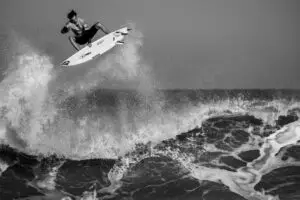Some of the links in this post are affiliate links. This means if you click on the link and purchase the item, we will receive an affiliate commission from the vendor at no extra cost to you. These business relationships allow us to keep bringing you great EatMoveHack content. All opinions remain our own.
Have you ever wondered how some people can do amazing things that seem impossible to most of us? How can a surfer ride a 100-foot wave, a skateboarder jump over the Great Wall of China, or a rock climber scale a sheer cliff without ropes? The answer is flow state!
These are not just feats of physical skill and courage, but also of mental focus and creativity. These are examples of what author Steven Kotler calls “flow”, a state of optimal consciousness where we feel and perform our best.
In his book, The Rise of Superman: Decoding the Science of Ultimate Human Performance, Kotler explores the secrets of flow state and how it can help us unlock our true potential in any domain. He draws on cutting-edge research in neuroscience, psychology, and biology, as well as interviews with dozens of extreme athletes who have mastered flow.
In this blog post, I will share some of the key insights from the book and show you how you can apply them to your own life. Whether you want to improve your productivity, creativity, happiness, or health, flow can help you achieve more than you ever thought possible.
What is Flow and Why Does It Matter?
Flow is a term coined by psychologist Mihaly Csikszentmihalyi to describe a state of mind where we are fully immersed in what we are doing, losing ourselves in the activity. We experience a sense of clarity, joy, and confidence, as well as a heightened awareness of our surroundings and ourselves.
Flow is not just a subjective feeling, but also a measurable phenomenon that has profound effects on our brain and body. When we are in flow, we release five powerful neurochemicals: dopamine, norepinephrine, anandamide, endorphins, and serotonin. These chemicals boost our motivation, attention, creativity, learning, memory, and mood.
Flow also changes the way our brain works. It shuts down the prefrontal cortex, the part of the brain responsible for self-criticism, doubt, fear, and inhibition. This allows us to act more instinctively, intuitively, and spontaneously. It also enhances our pattern recognition and lateral thinking skills, enabling us to make connections and solve problems faster and better.
Flow is not only beneficial for individuals, but also for groups and societies. When we are in flow with others, we experience a sense of trust, empathy, and cooperation. We also become more innovative, adaptable, and resilient. Flow can help us overcome challenges, achieve goals, and create positive change in the world.
How to Trigger Flow State in Your Life
Flow is not something that happens by chance or luck. It is something that can be cultivated and triggered by following certain conditions and practices. Kotler identifies four stages of flow: struggle, release, flow, and recovery. Each stage has its own triggers and strategies that can help us enter and sustain flow.
Struggle
The first stage of flow is struggle. This is where we face a challenge that is difficult but not impossible for us. It requires us to stretch our skills and abilities beyond our comfort zone. It also demands our full attention and concentration.
The key to triggering flow in this stage is to find the right balance between challenge and skill. If the challenge is too easy or too hard, we will either get bored or frustrated. If the challenge is just right for our skill level, we will experience what Csikszentmihalyi calls “the flow channel”.
To find your flow channel, you need to set clear goals that are specific, measurable, achievable, relevant, and timely (SMART). You also need to get immediate feedback on your performance so that you can adjust your actions accordingly. You also need to eliminate distractions and focus on one task at a time.
Release
The second stage of flow is release. This is where we let go of the struggle and relax our mind. We shift our attention from the problem to something else that is enjoyable or calming. We allow our subconscious mind to process the information and find solutions.
The key to triggering flow in this stage is to engage in activities that lower your stress levels and activate your parasympathetic nervous system (PNS). The PNS is responsible for rest and digestion functions in your body. It helps you recover from stress and restore your energy.
Some examples of activities that can trigger release are meditation, yoga, breathing exercises, music, reading, walking, or playing with a pet. These activities can help you clear your mind and prepare it for the next stage of flow.
Flow
The third stage of flow is flow itself. This is where we enter the zone and perform at our peak. We feel a sense of effortless action, control, and enjoyment. We are fully absorbed in the task and lose track of time and self.
The key to triggering flow in this stage is to maintain your focus and intensity. You need to avoid distractions and interruptions that can break your flow. Also, you need to challenge yourself and push your limits. You need to take risks and embrace uncertainty.
Some examples of activities that can trigger flow in this stage are sports, games, arts, hobbies, or work projects that you are passionate about. These activities can help you express your creativity and mastery.
Recovery
The fourth stage of flow is recovery. This is where we exit the zone and reflect on our experience. We feel a sense of satisfaction, gratitude, and accomplishment. We also feel a need to rest and replenish our resources.
The key to triggering flow in this stage is to acknowledge your achievements and celebrate your successes. You need to reward yourself and appreciate your efforts. Further, take care of your physical and mental health. You need to eat well, sleep well, exercise, and socialize.
Some examples of activities that can trigger recovery are journaling, sharing, reviewing, learning, or planning for the next challenge. These activities can help you consolidate your learning and growth.
How to Apply The Rise of Superman to Your Life
The Rise of Superman is not just a book about extreme athletes and their amazing feats. It is a book about how anyone can tap into the power of flow and achieve ultimate human performance in any domain.
Whether you want to write a novel, start a business, learn a language, or play an instrument, you can use the principles and practices of flow to enhance your skills and results.
Here are some steps you can take to apply The Rise of Superman to your life:
– Identify an area of your life where you want to improve or excel.
– Find a challenge that matches your skill level and interests.
– Set SMART goals and get immediate feedback.
– Eliminate distractions and focus on one task at a time.
– Engage in activities that lower your stress levels and activate your PNS.
– Maintain your focus and intensity.
– Take risks and embrace uncertainty.
– Acknowledge your achievements and celebrate your successes.
– Take care of your physical and mental health.
– Repeat the cycle with new challenges and goals.
By following these steps, you can create a habit of flow that will help you reach new heights of performance and fulfillment.
Conclusion
The Rise of Superman is a fascinating and inspiring book that reveals the secrets of flow and how it can help us unlock our true potential. By learning from the extreme athletes who have mastered flow, we can apply their mindset and methods to our own lives.
Flow is not a rare or mystical state that only a few can access. It is a natural and universal state that anyone can trigger and sustain with the right conditions and practices.
If you want to learn more about the science and art of flow, I highly recommend you read The Rise of Superman by Steven Kotler. It will change the way you think about yourself and what you are capable of.
I hope you enjoyed this blog post and found it useful. If you did, please share it with your friends and leave a comment below. I would love to hear from you.

